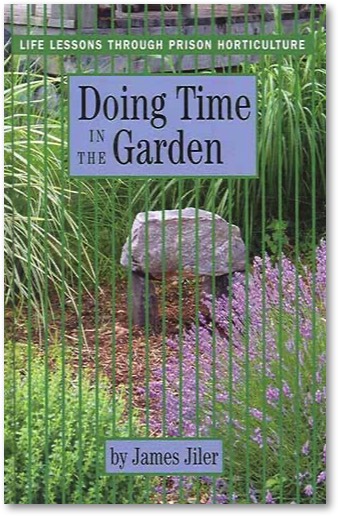
Musings » Doing Time in the Garden


Oakland, California
New Village Press 2006
All of us know that wonderful feeling of accomplishment and fulfillment which comes from spending a few hours working in the garden even it is only weeding. There is something about being outdoors and in touch with the earth which appeals to our very deepest instincts.
Based on this pretty well universal observation, prison authorities in many countries use gardening as a form of rehabilitation. The doyenne of English gardeners, Rosemary Verey, led such a movement in England. Under her guidance, prisoners at Ledhill Prison entered their garden in the Chelsea Flower Show one year and won a special prize.
This story was used as the basis of a charming romantic film “Greenfingers” which highlighted the extraordinary rehabilitative value of gardening in even the most unreconstructed rascals.
One of the chief characters is an old lifer convicted of murdering all three of his wives. His love of plants is communicated slowly and painfully to the main character. After the old man dies and the hero is released, life on the outside for him is difficult and frustrating. The hero breaks a shop window to get himself back inside the prison and resume his gardening.
I recently came across the aptly titled Doing Time in the Garden by James Jiler. (It is not in the club’s library.) Jiler writes about one specific prison complex in New York. There are ten separate prisons on Rikers Island, a huge place in Flushing Bay with up to 20,000 inmates at any one time. Most of the prisoners are there on remand or serving short sentences.
Rehabilitation and the prevention of recidivism are major goals but extremely hard to achieve. It is a sad fact that the majority of the inmates are poor minority men with very sketchy education and almost no useful skills of any sort. As soon as they are released they have almost no choice but to return to the behavior which got them arrested in the first place. Breaking this cycle is crucial.
The Horticultural Society of New York undertook a program in 1996 to see if classes in landscaping and horticulture could make a difference. The program was properly equipped with a greenhouse and classroom, and enough acreage to simulate the various conditions inmates might meet as they worked in garden projects around the city.
From the beginning the students grew food for the prison, and learned the essentials of landscaping from Mr Jiler and his colleagues, some of whom are specially trained corrections officers.
Nothing was easy at the beginning. Arranging to take prison inmates round the city was a difficult task because of security and departmental rules. Allowing men with violent histories to handle powerful tools like steel garden spades and forks was another very delicate question.
The program can only accommodate a fraction of the inmates who would like to participate. Most of the inmates either do very little all day long or are obliged to work at prison chores like kitchen work or cleaning the premises. The author indicates that simply being outdoors and physically active is beneficial for young people, quite independent of any knowledge they may absorb.
Forced farm work in penitentiaries was once part of the punishment. Even under that rather harsh regime there are indications that the men assigned to do farmwork were less violent and rebellious than the ones who stayed indoors all the time.
The difference now is the educational and therapeutic philosophy behind the program. The national recidivism rate is a very disheartening 67%. If a program like the one on Rikers Island is working that rate should drop for its graduates. James Jiler reports that this is in fact the case. The rate for his people is 26%.
Jiler tells stories about prisoners who have tried to make it on the outside and failed and those who have succeeded. After-care is essential. The “green” program is not a panacea, but thoughtfully applied can make a serious difference in a massive problem.
The body of this book consists of the curriculum, and methods of teaching city people without any prior exposure to nature how to become useful gardeners. It is much to be recommended in a grim and depressing segment of our society.

